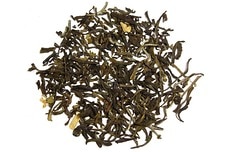20 Benefits of Green Tea That Will Make You Rethink Your Morning Coffee
Green tea comes from the leaves of the camellia sinensis plant, which is a small shrub that is native to East Asia and India (Tea Revolution, n.d.). While the drink has been enjoyed for centuries, even today, scientists continue to uncover new and exciting benefits of the beverage. Enjoying one or more cups of green tea per day could help you unlock some of these benefits.
Green Teas & More
1. Green Tea Is a Natural Stimulant
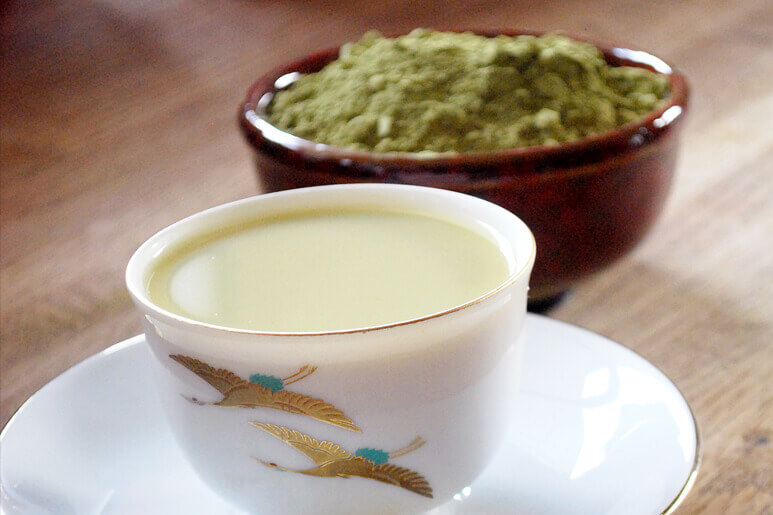
Green tea is a natural source of caffeine, making it a great way to perk yourself up when you’re feeling tired. The good news is that green tea contains less caffeine than coffee, meaning that you can sip this beverage throughout the afternoon without significantly disturbing your sleep or suffering through the jittery side effects of a caffeine overdose (Mayo Clinic, 2014).
2. Green Tea Might Help Fight Off Cancer
Your cells naturally accumulate oxidative damage during regular cell metabolism. A class of molecules called antioxidants can prevent or even reverse that damage. One of the most powerful antioxidants is called epigallocatechin gallate, and it is found in high levels in green tea. Epigallocatechin gallate has been shown to reduce the growth of breast and prostate tumors (Liao et al., 1995).
3. Minimal Processing Leaves Nutrients Intact
Unlike soda, another common source of caffeine, tea is relatively unprocessed. After picking the leaves, they are allowed to soften before being rolled to wring out their juices (Tea Class, n.d.). After heat is applied to the leaves, they are dried and ready to use. This minimal amount of processing means that green tea retains many of the phytonutrients that are available in the actual tea plant.
4. Green Tea is Associated with Lower Heart Disease Risk
Green tea may also be good for your heart. In a study of 40,530 Japanese individuals followed over seven years, drinking three to four cups of green tea per day was associated with a 31% lower risk of dying of cardiovascular disease (Kuriyama, 2006).
5. It May Rev Up Your Metabolism, Helping You Lose Weight
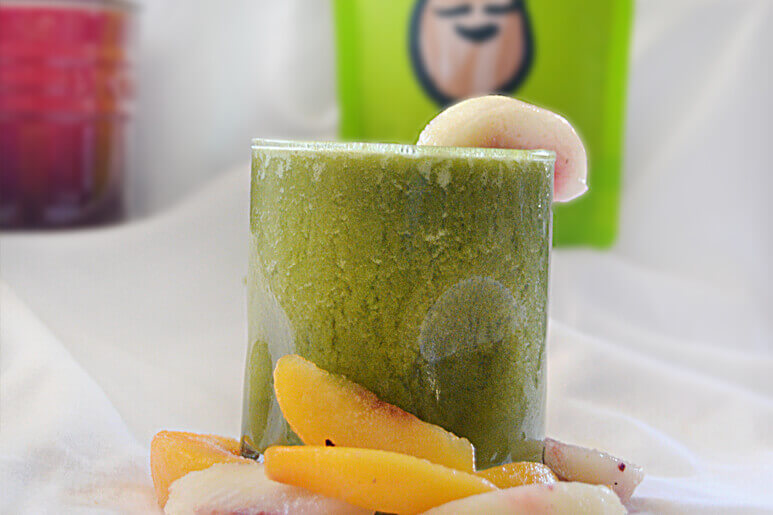
The phytonutrients in green tea may also help you lose weight and keep it off. A 2009 meta-analysis of studies in this area found that drinking catechin-rich green tea significantly reduced body weight (Hursel et al., 2009). Furthermore, people who drank green tea were more likely to maintain a healthy weight after significant weight loss.
6. Green Tea Balances Your Ratio of Good and Bad Cholesterol
Not all cholesterol is bad for you. Low-density lipoprotein (LDL) cholesterol is associated with cardiovascular risk, while high-density lipoprotein (HDL) cholesterol could actually protect you against heart disease. Although the exact mechanisms of this effect are unknown, the phytonutrients in green tea appear to be connected to balanced LDL and HDL cholesterol levels, helping to keep them in a healthy range (Maron et al., 2003).
7. Green Tea May Help You Chill Out
Green tea contains the amino acid L-theanine, which is found almost exclusively in tea plants (Raj Juneja et al., 1999). L-theanine acts as a neurotransmitter in the brain, meaning that it sends signals to neurons. Several studies have shown that L-theanine appears to increase alpha-wave generation in the human brain, signalling a state of relaxation (Raj Juneja et al., 1999).
8. It May Protect Your Brain Against Alzheimer’s Disease
Alzheimer’s disease is characterized by profound changes in memory and thinking abilities. This neurodegenerative disease currently has no cure. However, the antioxidants in green tea appear to reduce the likelihood that you will develop Alzheimer’s disease (Weinreb et al., 2004).
9. It May Also Provide Protection Against Parkinson’s Disease
Parkinson’s disease is a neurodegenerative condition that affects movement and fine motor control. Like Alzheimer’s disease, Parkinson’s disease is progressive and has no cure. The polyphenols in green tea may protect against cell injury caused by neurotoxins while promoting the survival of healthy cells (Pan, Jankovic, & Weidong, 2003).
10. Drinking Green Tea Keeps Your Mouth Healthy
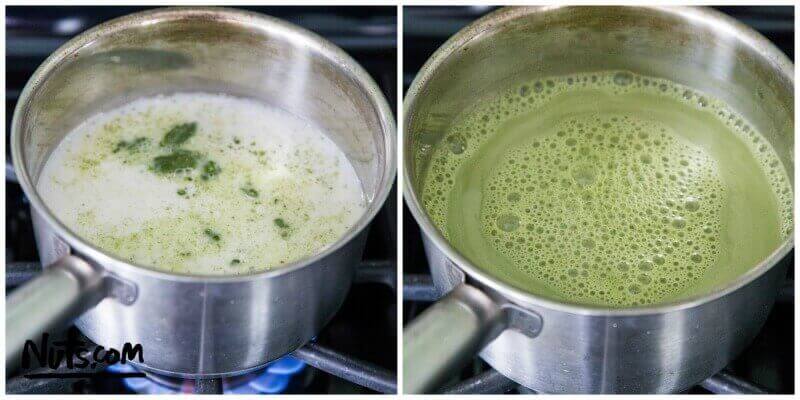
Your mouth is a breeding ground for bacteria. Green tea has natural antibiotic and antifungal properties. In fact, growing evidence suggests that drinking green tea could protect against cavities and bad breath (Narotzkia, 2012).
11. Green Tea Compounds Could Fight Against MRSA
Methicillin-resistant staphylococcus aureus, or MRSA, is a strain of antibiotic-resistant bacteria that is often transmitted in health care settings. Unlike regular staph infections, MRSA is not easily treated with antibiotics. Thus, new avenues for treatment are needed. Some preliminary evidence indicates that green tea may be helpful in the fight against MRSA (Zhao et al., 2001).
12. Drinking Green Tea May Stabilize Blood Sugar Levels
The flavonoids in green tea, including epigallocatechin gallate, have been shown to decrease the liver’s glucose production. This means that your body regulates blood sugar more effectively, keeping your glucose levels within a healthy range (Waltner-Law, 2002).
13. Green Tea Can Lower Your Risk of Type 2 Diabetes
Type 2 diabetes is becoming an epidemic in the United States, with nearly 10% of the population having this condition (American Diabetes Association, 2016). Drinking green tea could lower your risk. Compared to those who drank one cup per week, participants who drank more than six cups of tea per day had an astonishing 33% lower risk of type 2 diabetes (Iso et al., 2006). This effect remained even after researchers controlled for factors such as age, sex, and body mass index.
14. The Fluoride in Green Tea Promotes Healthy Teeth
Green tea contains fluoride, the mineral that is added to the water supply to support stronger dental health (Fung et al., 1999). Small increases in the amount of fluoride can prevent bacteria from attacking teeth.
15. Green Tea Keeps Bones Strong
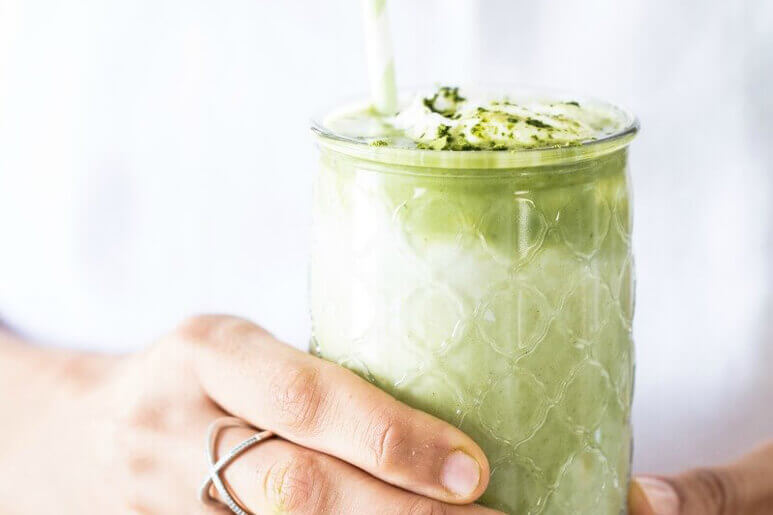
Loss of bone strength is a major public health problem, particularly for postmenopausal women, who are at high risk for osteoporosis. The polyphenols in green tea may increase bone mass, protecting bone tissue from damage (Shen et al., 2008).
16. Antioxidants in Green Tea Boost the Immune System
Drinking green tea might fend of the sniffles this winter. In a randomized controlled trial, 32% fewer participants taking green tea extract developed cold or flu symptoms compared to a placebo control group (Rowe et al., 2006). The exact mechanisms behind this effect are unknown, but they could be related to the vitamin C content in green tea.
17. Green Tea Keeps You Looking Youthful
Not only is green tea good for your physical health, but it could also keep you looking great! Beauty experts commonly use green tea products for their anti-inflammatory effects. For instance, a combined regimen of 10% green tea cream and green tea supplements improves the elasticity of skin, which keeps your skin looking more youthful as you age (Chiu et al., 2005).
18. Green Tea Can Help You Reduce Your Sugar Intake
Green tea is a healthy choice for those worried about added sugars, because it naturally contains zero grams of sugar. Compared to soda and fruit juice, which both contain a lot of sugar, green tea is the healthier choice. If you are accustomed to sugary beverages, it may take some time to adjust to the more astringent flavor of green tea. One good way to reap the benefits of green tea is to mix a tablespoon or two of matcha green tea powder into your smoothies until you get used to drinking green tea on its own.
19. Green Tea Can Boost Your Productivity
As a mild stimulant, green tea can help you concentrate better. If you are feeling a mid-afternoon slump, brew yourself a cup of green tea to perk yourself up and enhance your productivity.
20. Green Tea is Connected to Longer Life
The accumulated health benefits of green tea mean that it may help you live longer. Indeed, one large study that followed participants over 11 years found that drinking three or four cups of tea each day lowered risk of mortality by 5% for men and 18% for women (Kuriyama, 2006).
Green Tea Recipes
Looking for a more creative way to enjoy the benefits of green tea than a standard cup of herbal tea? These recipes incorporate the plant into treats that complement its unique natural flavor with complementary tastes and textures.
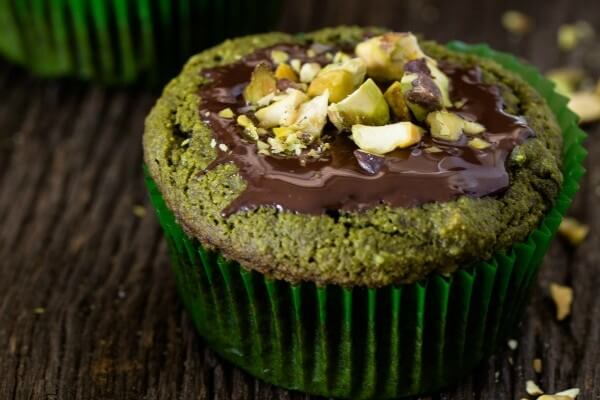
Matcha Green Tea Muffins Recipe {gluten-free}
You don’t have to limit your green tea consumption to a beverage, and these mouthwatering muffins make it easy to add more of the herb and its beneficial phytonutrients to your diet. Enjoy a muffin in the morning or add sweet toppings for a scrumptious dessert!
Ingredients: Almond flour, coconut flour, gluten-free rolled oats, egg, olive oil, vanilla extract, almond milk, unrefined sugar, matcha green tea powder, baking powder, baking soda, dark chocolate chips, coconut oil, pistachios.
Total Time: 1 hour
| Yield: 10 muffins
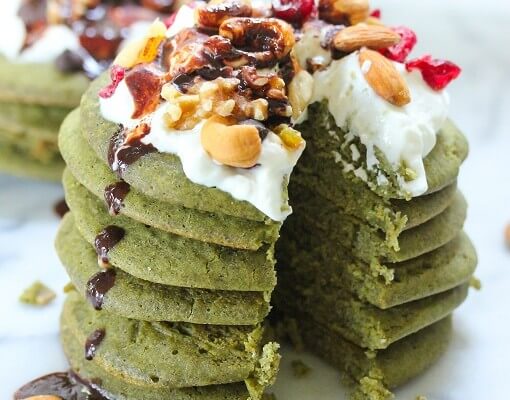
Matcha Green Tea Pancakes Recipe {gluten-free}
Another matcha-based morning meal, these green tea pancakes serve up a scrumptious source of the plant and its particular palate. Similar to the muffins listed above, these pancakes pair perfectly with sweeter toppings to create a meal that can be enjoyed anytime!
Ingredients: Almond milk, brown rice flour, egg, sugar, coconut oil, matcha green tea powder, hemp protein powder, butter, greek yogurt, walnuts, almonds, banana chips, cranberries, golden raisins, maple syrup, cacao powder, baking powder.
Total Time: 15 minutes
| Yield: 9-10 pancakes
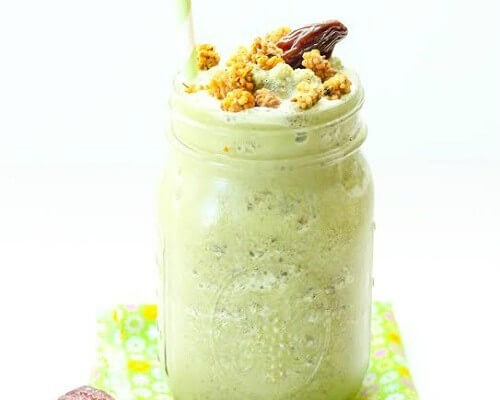
Matcha Green Tea Smoothie Recipe {gluten-free, vegan}
Searching for a smoothie that serves as a meal replacement or a satiating treat? This superb recipe combines the natural savor of the herb with other healthful ingredients like flaxseed, hemp protein powder, and mulberries for a treat to help meet your nutritional needs.
Ingredients: Almond milk, matcha green tea powder, hemp protein powder, almond flour, dried mulberries, pitted dates, flaxseed meal, ice cubes, stevia powder.
Total Time: 5 minutes
| Yield: 4 smoothies
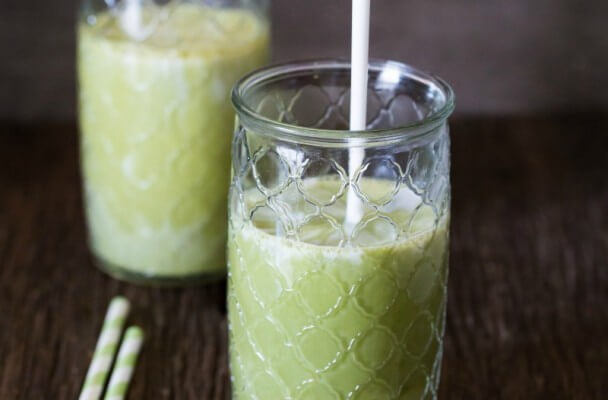
Matcha Green Tea Latte Recipe {Vegan}
If you’re a fan of the sweet drink that has everyone enjoying more of that distinctive green tea taste then this recipe is sure to please your palate. Indulge with this sugary latte to enjoy the benefits of the herb with a flavor that is sure to sate even the most demanding sweet tooth.
Ingredients: Matcha green tea powder, sugar, vanilla extract, almond milk, coconut milk, coconut cream.
Total Time: 5 minutes
| Yield: 4 servings
Green Tea Products
Searching for the right tea leaves to meet your particular needs? We have different types of green tea to accommodate different tastes, as well as bottled tea to accommodate busy schedules.
Healthy Eating
- Healthy Snacks
- Healthy Meals
- Healthy Recipes
- Sports Nutrition
- Nutrition and Special Diets
- 21 Day Fix
- 5 Popular Diet Similarities
- Alkaline Diet
- Anti-Inflammatory Diet
- Calorie Counting
- Carb Cycling Diet
- Celiac Disease
- Cholesterol
- Clean Eating
- Crohn's Disease
- DASH Diet
- Detox Diet
- Diabetes
- Diabetes Diet
- Diet Pill Dangers
- Fat Burning Foods
- Gluten-free Diet
- Glycemic Index
- Heart Health
- High Blood Pressure Diet
- High Fiber Foods
- How to Eat Healthy
- How to Lower Blood Pressure
- Hypertension
- IBS Diet
- Ketogenic Diet
- Liquid Diet
- Low GI Foods
- Low-Carb Diet and Foods
- Low-Fat High-Carb Diet
- Mediterranean Diet
- Mediterranean Diet Foods
- Military Diet
- Nutrition Labels Explained
- Paleo Diet
- Raw Food Diet
- Superfoods
- Sustainable Weight Loss
- Thrive Diet
- Vegan Diet
- Vegetarian Diet
- Weight Loss Shakes
- Whole30
- Vitamins, Minerals & Nutrients










